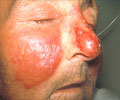The global burden of Group B streptococcus is far higher than previously recognized, linked to over half a million preterm births annually, as well as leading to nearly 100,000 newborn deaths, at least 46,000 stillbirths, and significant long-term disability.

‘New vaccines are urgently needed to reduce deaths associated with Group B strep and protect the lives and health of infants around the world.’





The report calls urgently for the development of maternal vaccines against GBS to reduce this toll, emphasizing they could be highly cost-effective with significant health benefits in all regions of the world.Dr. Phillipp Lambach, Medical Officer from WHO’s Immunization, Vaccines and Biologicals department, and report author, said: “This new research shows that Group B strep is a major and underappreciated threat to newborn survival and wellbeing, bringing devastating impacts for so many families globally. WHO joins partners in calling for urgent development of a maternal GBS vaccine, which would have profound benefits in countries worldwide”.
This new research quantifies the major contribution of GBS to preterm births, as well as neurological impairments such as cerebral palsy, hearing and vision loss that can occur following GBS-associated infections.
Several GBS vaccine candidates are in development but none are yet available, despite having been in the pipeline for several decades.
An average of 15% of all pregnant women worldwide nearly 20 million annually carry the GBS bacterium in their vagina, usually without symptoms. It can then spread from a pregnant woman to her unborn baby in the womb, or newborns during labor.
Advertisement
However, even in regions with high prophylactic coverage, there remain significant health risks, since this intervention is unlikely to prevent most GBS-associated stillbirths, preterm births, or GBS disease that occurs later after birth.
Advertisement
The highest rates of maternal GBS are found in sub-Saharan Africa (accounting for around half of the global burden), and Eastern and South-Eastern Asia.
The report calls for researchers, vaccine developers, and funders to accelerate the development of an effective GBS vaccine that could be administered to pregnant women during routine pregnancy check-ups.
Estimates suggest that if GBS vaccination reached over 70% of pregnant women, then over 50,000 GBS-related deaths could be averted annually - as well as over 170,000 preterm births.
According to the report, the net monetary benefits from a year of maternal GBS vaccination could reach as high as $17 billion accruing over several years if vaccines are affordably priced.
This report was launched at the global conference on GBS, the ISSAD conference being held by WHO and LSHTM from Wednesday 3 November to Friday 5 November 2021.
This conference aims to mobilize researchers on how to close data gaps and accelerate science to reduce the impacts of this life-threatening bacterium worldwide.
Source-Medindia















